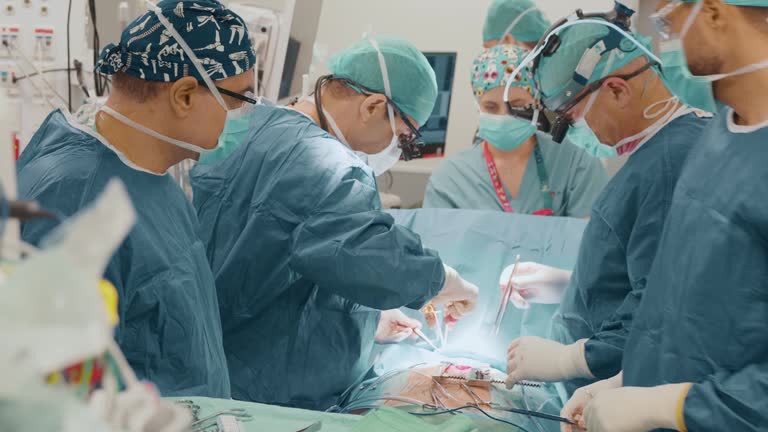Open-heart surgery is a major surgical procedure that involves opening the chest to operate on the heart. This procedure is typically performed to treat serious heart conditions that cannot be treated with medication or less invasive procedures.
Types of Open-Heart Surgery
Several types of open-heart surgery are performed, depending on the specific heart condition:
- Coronary Artery Bypass Graft (CABG): This procedure is used to treat coronary artery disease, a condition in which the arteries that supply blood to the heart become narrowed or blocked. During CABG, a healthy blood vessel is grafted onto the heart to bypass the blocked or narrowed artery.
- Valve Replacement Surgery: This procedure is used to replace a damaged heart valve with a mechanical or tissue valve.
- Heart Transplant: This procedure involves replacing a failing heart with a donor heart.
- Maze Procedure: This procedure is used to treat atrial fibrillation, a type of irregular heartbeat. It involves creating small incisions in the heart tissue to disrupt the abnormal electrical signals.
The Open-Heart Surgery Procedure
- Anesthesia: Patients are typically given general anesthesia, which means they will be unconscious during the surgery.
- Chest Incision: A surgeon makes an incision in the chest to access the heart.
- Heart-Lung Machine: A heart-lung machine is used to take over the functions of the heart and lungs during the surgery.
- Surgical Procedure: The surgeon performs the necessary procedure, such as repairing a valve, bypassing a blocked artery, or transplanting a heart.
- Closure: Once the procedure is complete, the chest is closed, and the patient is taken to the recovery room.
Risks of Open-Heart Surgery
While open-heart surgery is a life-saving procedure, it carries certain risks, including:
- Bleeding: Excessive bleeding can occur during or after surgery.
- Infection: There is a risk of infection at the incision site.
- Stroke: In rare cases, stroke can occur during surgery.
- Heart Attack: The risk of heart attack is increased during surgery.
- Kidney Failure: Kidney function may be impaired, especially in patients with underlying kidney disease.
It’s important to discuss the potential risks and benefits of open-heart surgery with your cardiologist. By understanding the procedure and the potential risks, you can make informed decisions about your treatment.
Remember, open-heart surgery is a major procedure, and recovery takes time. It’s essential to follow your doctor’s advice and take care of yourself during the recovery process.



It’s refreshing to see a unique perspective on this topic.
Your blog keeps me engaged from beginning to end. I can never scroll away without devouring your complete article.
I admire how you simplify complex concepts into comprehensible chunks. Well done!
Привет всем, кто ищет решения!
Попробуйте ChatGPT для креативных решений: сочините мотивирующие стихи, разберитесь в запутанных материалах или создайте стратегию роста. ChatGPT для студентов — подготовка к экзаменам, составление конспектов. ChatGPT для туристов — маршруты по неизвестным местам. Технологии работают на вас — эффективно и с вдохновением, без ограничений!
Подробнее здесь: https://yarchatgpt.ru
скачать чат гпт на чат интеллектуальный бот чат 18000
изменить текст своими словами онлайн
Каждая попытка — это рост!
jj45xv
Awesome https://is.gd/tpjNyL
Very good https://is.gd/tpjNyL
Great beat ! I wish to apprentice while you amend your web site, how can i subscribe for a blog website? The account helped me a acceptable deal. I had been tiny bit acquainted of this your broadcast provided bright clear concept
very good post, i certainly love this website, keep on it